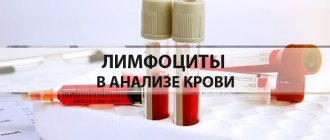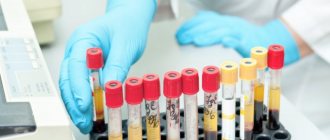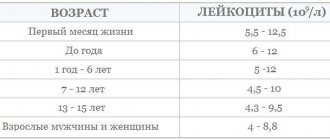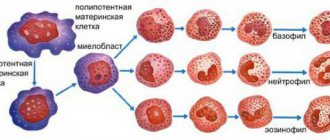CPK (creatine kinase, creatine phosphokinase) in the blood: what it is, reasons for increased enzyme levels.
Among the numerous enzymes contained in human blood, there is one enzyme that is necessary in every cell of the body, and most of all in the cells of nervous tissue and muscles. This element is called creatine kinase or creatine phosphokinase .
KFC: what is it?
Creatine kinase is an enzyme that accelerates the transfer of a phosphoryl residue from adenosine triphosphate (ATP) to creatine. In this case, adenosine diphosphate is formed, and the energy that was previously hidden in the high-energy bonds of ATP is released and used. These complex biochemical processes provide the muscles with the energy they need to contract.
Since muscles contract almost continuously (heart function, intestinal motility, regulation of blood vessel lumens, swallowing, etc.), creatine kinase is continuously used by the body.
Creatine kinase, like other enzymes, is a protein and therefore composed of amino acids. Amino acids enter the body with protein foods, and then the necessary proteins or other amino acids are formed from them.
Loss of muscle mass or lack of dietary protein can affect the amount of creatine kinase in the blood.
Creatine kinase (Creatine phosphokinase CPK)
Creatine kinase is an enzyme that stimulates the conversion of creatine into creatine phosphate and provides energy for muscle contraction.
Research method
UV kinetic test.
Units
U/L (unit per liter).
What biomaterial can be used for research?
Venous blood.
How to properly prepare for research?
- Do not eat for 12 hours before the test.
- Avoid physical and emotional stress for 30 minutes before the test.
- Do not smoke for 30 minutes before donating blood.
General information about the study
Creatine kinase is an enzyme that catalyzes the transfer of a phosphoryl residue from ATP to creatine to form creatine phosphate and ADP. The reaction, catalyzed by creatine kinase, provides energy for muscle contraction. There are creatine kinase contained in the mitochondria and cytoplasm of cells.
The creatine kinase molecule consists of two parts, which can be represented by one of two subunits: M, from the English muscle, and B, brain. Thus, in the human body creatine kinase exists in the form of three isomers: MM, MB, BB. The MM isomer is found in skeletal muscles and myocardium, MV - mainly in the myocardium, BB - in brain tissue, and in small quantities in any cells of the body.
In the blood of a healthy person, creatine kinase is present in small quantities, mainly in the form of the MM isomer. Creatine kinase activity varies with age, gender, race, muscle mass, and physical activity.
Creatine kinase enters the bloodstream in large quantities when the cells containing it are damaged. At the same time, based on the increase in the activity of certain isomers, one can conclude which tissue is affected: MM fraction – muscle damage and, to a lesser extent, heart damage, MV fraction – myocardial damage, BB fraction – cancer. Typically, tests are done for total creatine kinase and its MB fractions.
Thus, an increase in creatine kinase in the blood allows us to draw a conclusion about a tumor process, damage to the heart or muscles, which in turn can develop both with primary damage to these organs (during ischemia, inflammation, trauma, degenerative processes), and as a result of their damage during other conditions.
Muscle diseases in which cells are destroyed are myositis, myodystrophy, injuries, especially when compressed, bedsores, tumors, intense muscle work, including what occurs during convulsions. In addition, there was an inverse relationship between the levels of thyroid hormones and creatine kinase: with a decrease in T3 and T4, the activity of creatine kinase increases and vice versa.
When is the study scheduled?
- For symptoms of coronary heart disease.
- With symptoms of myocardial infarction, in particular with a blurred clinical picture, especially with a recurrent infarction, atypical localization, pain or ECG signs, difficulty in differential diagnosis with other forms of coronary heart disease.
- For hypothyroidism.
- For symptoms of myositis, myodystrophy, myopathy.
- When planning pregnancy by a woman whose family had Duchenne myopathy patients.
- For diseases that can lead to damage to the heart or muscular system.
What do the results mean?
| Gender/age | Reference values |
| Male/ > 17 years old | |
| Female/ > 17 years old |
The results of the analysis indicate the presence or absence of damage to the myocardium, skeletal muscles, tumor process, and thyroid diseases. The correct interpretation of the obtained indicators allows us to draw a conclusion about the form of the lesion and the degree of its severity.
Reasons for increased total creatine kinase activity:
- myocardial infarction,
- myocarditis,
- myocardial dystrophy,
- polymyositis,
- dermatomyositis,
- muscular dystrophy,
- injuries, burns,
- hypothyroidism,
- tumor process in the body,
- tumor disintegration,
- taking dexamethasone, statins, fibrates, amphotericin B, painkillers, alcohol, cocaine,
- intense physical activity,
- seizures, status epilepticus,
- surgical interventions.
Reasons for decreased activity of total creatine kinase:
- decrease in muscle mass,
- alcoholic liver damage,
- collagenoses (for example, rheumatoid arthritis),
- hyperthyroidism,
- taking ascorbic acid, amikacin, aspirin,
- pregnancy.
Causes of increased creatine kinase
So what causes an increase in the concentration of creatine kinase in the blood? There are a great many such reasons, among them are dystrophies, burns, cancer, and simply intense physical activity. Well, most often the reasons are the following:
- Polymyositis (an autoimmune disease in which cells of the immune system begin to attack muscle tissue, causing damage to almost all muscles);
- Myocardial dystrophy (dystrophy of the heart muscle);
- Myocarditis (inflammation of the heart muscle);
- Oncological diseases (most often at the stage of tumor decay, which is usually accompanied by severe poisoning of the body);
- Convulsions, especially common during epilepsy;
- Overdose of certain drugs (statins, fibrates, amphotericin);
- Alcoholism, alcohol poisoning;
As for muscle overwork, an increase in creatine kinase is observed only in cases where the muscles begin to break down from overwork. This is accompanied by acute pain (sores) associated with the accumulation of metabolic products in muscle tissue.
It happens that creatine kinase also increases after surgery, and the more difficult the postoperative period is, the greater the likelihood of an increase in the concentration of this substance.
Interestingly, constantly elevated levels of creatine kinase can be observed in mentally ill people, namely those suffering from schizophrenia, manic-depressive psychosis , and those who abuse psychotropic drugs.
Indications and results
Indications for analysis are:
- Meloxicam: use of intramuscular form in rheumatology
- early diagnosis of myocardial infarction (analysis is required within the next 2-4 hours);
- differential diagnosis of myocardial infarction, when this attack is combined with a mild or uncomplicated attack of angina.
In addition, this test is prescribed to all patients who are being treated for any heart disease in order to exclude the possibility of a heart attack. It is knowledge of the level of CPK (what it is, described above) that will help specialists determine the condition of the heart. An increase in this substance in the blood can signal possible heart problems. If this phenomenon is permanent, then the doctor in most cases decides on preventive treatment, which will stop the development of the disease in the future.
Blood CPK (what it is, you can find out at the beginning of the article) is elevated in the following cases:
- myocardial infarction (increased values are diagnosed in the first 2-4 hours, the maximum is reached after 24 hours; after 3-6 days the value decreases, but normalization does not occur);
- muscle dystrophy;
- Reye's syndrome (acute hepatic encephalopathy);
- state of shock;
- various poisonings, in particular with alcohol and sleeping pills;
- infectious lesions of the myocardium.
A reduced level of CPK in the blood (what it is, described above) is observed with a decrease in muscle mass, a sedentary lifestyle, and also acts as an indirect sign of the development of thyrotoxicosis (intoxication with thyroid hormones that are produced by the thyroid gland).
Reasons for the downgrade
Of course, in certain situations, creatinine kinase can drop sharply. This happens in the main period when a person’s muscle mass decreases. Any fluctuations in muscle mass can be a consequence of natural processes, as well as the results of various diseases. Typically, muscle mass decreases with age, a phenomenon called sarcopenia . A painful decrease in muscle mass is observed, for example, with prolonged fasting, lack of protein food, and infectious lesions of muscle tissue.
Also, a decrease in creatine kinase can be observed with alcoholic liver damage and liver cirrhosis. of ascorbic acid, aspirin, and amicocin also leads to similar results . Pregnant women also experience a slight decrease in the concentration of creatine kinase, which is quickly replenished after childbirth.
Neither an increase nor a decrease in creatine kinase is not a specific sign by which one can judge the presence of any disease in the body.
We see that there are a large number of diseases associated with fluctuations in the concentration of this enzyme, so before drawing conclusions about the patient’s health, additional examination should be carried out.
CPK levels in women
There are a number of features of the female body associated with the metabolism of creatine kinase. Firstly, due to the fact that women have less developed skeletal muscles, the concentration of this enzyme in their blood is noticeably lower than in men.
Secondly, the amount of creatine kinase may decrease slightly , while the amount of this enzyme in the placenta and placental blood, on the contrary, is higher than in the rest of the human bloodstream. This affects the amount of blood enzyme in a newborn baby, which is also higher.
Thirdly, the gene for congenital muscular dystrophy is often detected in young women. This is a rare genetic disease, the gene for which is located on the X chromosome, as well as the gene responsible for hemophilia. Just like hemophilia, muscular dystrophy most often affects boys. A woman who carries the gene has a 100% chance of having a son with the disease .
Changes in the body during pregnancy
During pregnancy, the level of creatine kinase decreases slightly, which has virtually no effect on the mother’s well-being or her health in the future. This decrease is associated not only with bearing a child, but with the fact that the lifestyle of the expectant mother changes, or physical activity decreases significantly, especially in the later stages.
At the same time, the fetus's creatine kinase levels are elevated. For comparison: if an adult woman has 167 units of creatine kinase per liter in her blood, then a fetus in late pregnancy has 650 or more .
Enzyme content in children
In children, the level of creatine kinase in the blood is very high, especially in the first days of life. So, for the first 5 days, the level of creatine kinase remains the same as that of the fetus before birth, that is, about 650 units per liter of blood. However, over the next 6 months, the amount of enzyme decreases by 2-2.5 times.
Until the age of one year, the amount of creatine kinase continues to fall; at the age of about one year it is about 200 units per liter. Then, due to the child's increasing activity, the amount of creatine kinase increases again. In time, this coincides with teaching a child to walk, run, manipulate objects, and so on.
But, if by the age of three the amount of creatine kinase reaches 220 units , then it begins to fall again, and by the age of six it is already 149 units.
From the age of 9-10 years, a child begins puberty, and the concentration of blood enzymes in girls and boys begins to differ.
The reasons for deviations from the norm in children are the same as in adults, with the exception, of course, of pregnancy. It should be borne in mind that children are more likely than adults to be overtired, and also often experience a lack of protein due to poor nutrition.
References
- Clinical guidelines for the diagnosis and treatment of myocarditis, 2019. - 133 p.
- Acute myocardial infarction with ST segment elevation of the electrocardiogram. Clinical guidelines, 2021. - 157 p.
- Mucocutaneous lymphonodular syndrome [Kawasaki] (Kawasaki syndrome/disease) in children. Clinical guidelines, 2021. - 41 p.
- Aydin, S., Ugur, K., Aydin, S. et al. Biomarkers in acute myocardial infarction: current perspectives. Vasc Health Risk Manag, 2021. - Vol. 15. - P. 1-10.
- Cao, F., Zervou, S., Craig, A. et al. The creatine kinase system as a therapeutic target for myocardial ischaemia–reperfusion injury. Biochem Soc Trans, 2021. - Vol. 46(5). — P. 1119-1127.
What are the dangers of deviation from the norm?
Creatine kinase itself is not a toxic substance, so an excess does not pose any threat to the human body.
Serious threats to it are those diseases that caused an excess of this enzyme, for example, cancer, heart attacks, inflammatory processes in the muscles, various poisonings, and so on.
A lack of creatine kinase can affect the functioning of muscles and the nervous system . It causes muscle weakness, fatigue, dizziness, problems with attention and the ability to perform physical work.
Preparing for the study
In order to find out what the concentration of creatine kinase is in your blood, you can go to a regular hospital. The concentration of creatine kinase is determined during a routine biochemical blood test. One day is enough to receive test results. Such an analysis costs about 370 rubles. To carry it out, blood is taken from a vein. Referrals for analysis can be obtained from a general practitioner, oncologist, cardiologist, and other specialists.
You should prepare for that crowd the same way as any other: the analysis is done in the morning on an empty stomach , 8 hours after the last meal. It is advisable not to smoke, drink, or take medications 3 days before the test. Since the amount of enzyme directly depends on physical activity, you should also not engage in sports or heavy physical labor.
When is the test prescribed?
CPK is found in skeletal muscle, smooth muscle, heart and brain. Therefore, if an increased result is obtained, serious diseases such as myocardial infarction, chronic muscle diseases and even oncology can be suspected.
Creatine phosphokinase (CPK) - 250 rub.
Urgent analysis - 500 rub.
Deadlines
Normal – 1 day.
Urgent – 1.5 – 2 hours.
Taking blood from a vein is paid separately - 300 rubles.
(If several tests are performed simultaneously, the service for collecting biomaterial is paid once)
Indications
- Comprehensive diagnosis of diseases associated with muscle cell damage.
- To confirm myocardial infarction and during the recovery period to assess the condition of the heart muscle.
- If oncology is suspected as part of a comprehensive diagnosis and to assess the effectiveness of treatment.
- To assess the severity of muscle injury.
To obtain an accurate result, you must strictly follow the preparation tips. Laboratory equipment is no less important, so it is recommended to contact only those clinics that are equipped with modern equipment.
Material for analysis
venous blood serum (avoid hemolysis)
Preparing for the study
As a rule, before taking the analysis you need to do the following:
- Tell your doctor about the medications you are taking; they may need to be stopped temporarily. If it is impossible to cancel, then you need to donate blood before taking the medicine in the morning.
- Avoid eating 8 hours before blood sampling. Therefore, it is best to take the test in the morning, on an empty stomach.
- The day before blood sampling, you must avoid fatty, fried, spicy and salty foods. Alcohol and kvass are strictly excluded.
- It is worth telling your doctor about a recent ultrasound or x-ray. These examinations may affect the results.
- It is important to avoid intense physical activity - after exercise, muscle cells are damaged, which leads to an increase in enzyme levels. This may make it difficult for your doctor to interpret the results.
- It is recommended to avoid emotional stress before donating blood.










